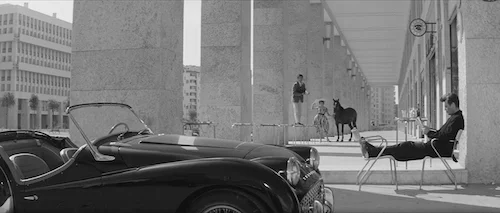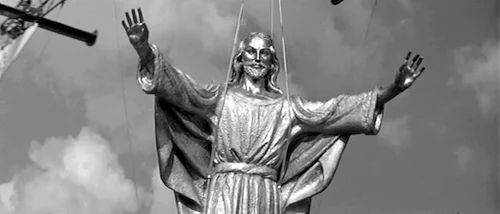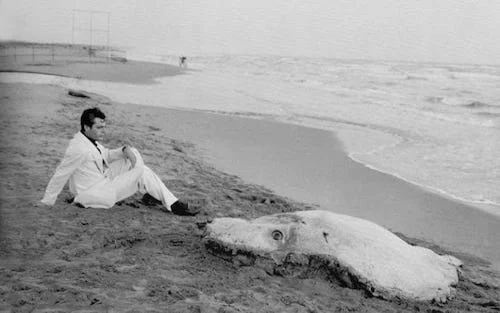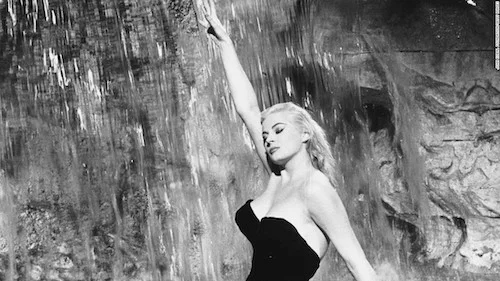La Dolce Vita: On-This-Day Thursday Review
Every Thursday, an older film released on this opening weekend years ago will be reviewed. They can be classics, or simply popular films that happened to be released to the world on the same date.
For April 18th, we are going to have a look at La Dolce Vita.
8 1/2 was the result of a visionary that could not make up his mind. La Dolce Vita is the work from that same artist when everything lined up for him. Federico Fellini is synonymous with high end Italian cinema: the kind of mastermind that helped turn Italy into the aristocratic wonderland of the cinematic world. La Dolce Vita means "the sweet life", and it is a three hour tour through luxury on paper. It's the kind of film that exhibits little blatant depth at first glance, because you meander through so many sites and chapters. It's a rare journey that you feel is aimless, yet you know there is a reason for all this.
When you decide to figure out what it's all about, that's when its true poignancy rises to the top. It was there all along! This excavation for the good life is as successful as it is a complete failure. Riches. Landmarks. Gourmet food. Sex. None of that matters if the pursuit keeps going. Roger Ebert repetitively claimed this was his all time favourite film (next to Citizen Kane, on occasion), and that he was delivered a new story every decade he witnessed it. It was a trip through a higher class lifestyle we'd never get otherwise. It became a soul searching journey. It evolved into an example of pity. By allowing La Dolce Vita to dictate its own measures, it has rendered a non-singular identity, even by top critics standards. I have not even reached half the life (in terms of duration and success) as Ebert, and I still have experienced the transformation La Dolce Vita has through your life (not its own).
An example of the film’s stunning cinematography.
We spend a week with Marcello Rubini, and hop in to the many whirlwind extravaganzas of Italian ritz culture. As if Fellini were Shakespeare himself, a new word was created by the late filmmaker: paparazzo. The term (meant to describe an eager sparrow) was applied to this kind of photojournalist that squeezed their way into any scenario. Rubini interacts with these kinds of photographers (one is literally named Paparazzo), but he doesn't fully belong there either. He wants to be in this life, not just watch or chase it. What good is looking on, when you can make it part of you?
That's why La Dolce Vita's loose narrative style works. We take our time in this three hour mission to experience it all. The visuals are still outstanding, and they are verging on sixty years old. Fellini knew that making this film all about fashion and class wasn't enough. We had to have some slight disbelief. Starting the film off with a statue of Jesus Christ being carried by helicopter was enough. This can happen. We just don't usually see it happen. It sets the tone: what other tastes of a new world will there be? The iconic Trevi Fountain scene is taken for granted, because there are high chances that any of us that have visited said monument have not been in the actual waters. Sure, it's glamorous to witness, but don't forget the border between what is preferred and what is happening.
The statue of Jesus Christ being carried by helicopter at the beginning of the film.
We see ourselves in Rubini (played by the always charming Marcello Mastroianni). We are so close but so far. Even when Rubini indulges in sweetness, uncertainty is around the corner. An aquatic beast is beached, and death is its invitation. It swam too close to the top of the sea, and it was tested. Humanity verged too close into nature, and it is slaughtering it. This is wanting too much and seeing the negative form out of a positive. A sick child is an even more conflicting image. Why does a parent deserve this? This wasn't a selfish chase for glory. This was gifting a human life. What's the lesson here? Sometimes, in La Dolce Vita, it's just simply the cycle of life; the ouroboros that feeds and kills itself repetitively.
Rubini with the unspecified aquatic creature.
The lengthy run time allows all of this to unfold. There is no rushing. We take our time. It's strange, because many epics are treated as if they are a chore. La Dolce Vita still somehow does not feel long enough. This blend of comfort and alienation is a blissful tug-of-war. Even the sad moments are so foreign to us. What exactly is this sea creature? What causes heart attacks at just the wrong time? What drives someone to domestic murder suicide? Everything is tangible yet out of reach. The entire film feels like a fantasy universe, but it all exists in real life. These are questions that may not have exact answers: finding new species, serendipity, and madness.
La Dolce Vita's main exercise is to be like one of those theoretical questions you love to stump people with. It does this for a few hours. You give up trying to explain it as you watch, but you have all the time in the world to figure it out after. Not many films have created a reality that feels frozen in time quite like this masterwork. We've reached a life of spoils, yet we just don't belong here. The elite here have achieved this status, yet they are still chased by the four horsemen of the apocalypse. Turmoil stops for no one. Wealth is a gamble. Stature is earned. It's too bad how misery can't be dodged.
Sylvia in the landmark Trevi Fountain sequence.
But La Dolce Vita does prioritize joy over sadness or anger, and it shows. The times of severity are never glossed over, but we get to revisit a new world every chapter. We start all over again. We end one way (bittersweet or depressing), and we try another day. By the end, we learn what exactly enough is. Life is made sweet by what you decide sweetness is. There will always be pain, but you can determine what takes that pain away. An appreciation for life itself is the sweetness Fellini is trying to showcase. We are intrigued by the film's grandiose foundation, yet we leave the picture appreciating the little things (and not feeling pressured to figure it all out). Not many films figure life out so well. La Dolce Vita is an exception that did so with the kinds of lifestyles most of us would never even dream of obtaining. Now, that's a gift.
Andreas Babiolakis has a Masters degree in Film and Photography Preservation and Collections management from Ryerson University, as well as a Bachelors degree in Cinema Studies from York University. His favourite times of year are the Criterion Collection flash sales and the annual Toronto International Film Festival.









